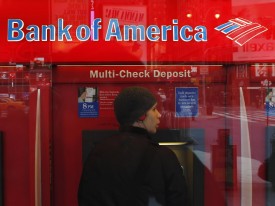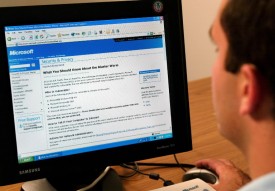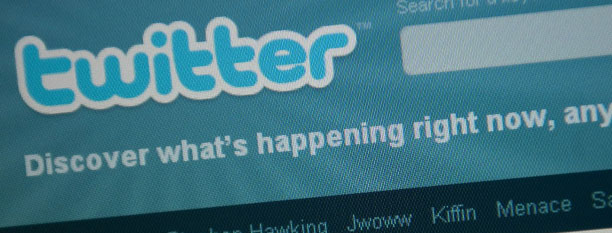Friday at 2:52 p.m.
Filed under:
Consumer news,
Internet
By Reuters
The Obama administration urged the private sector Friday to develop methods that consumers can use instead of passwords to identify themselves online and, in some cases, in brick and mortar stores.
“The Internet has transformed how we communicate and do business,” said President Barack Obama in a statement accompanying release of a national strategy to safeguard identity on the Internet. Get the full story »
March 14 at 10:04 a.m.
Filed under:
Internet
By Reuters

A Bank of America customer uses an ATM. (Reuters/Lucas Jackson)
Anonymous, a hacker group sympathetic to WikiLeaks, released on Monday emails that it obtained from someone who said he is a former Bank of America Corp employee.
In the emails dating from November 2010, people that appear to be employees of a Balboa Insurance, a Bank of America insurance unit, discuss removing documents from loan files for a group of insured properties.
Neither the emails nor correspondence released by Anonymous indicate the reason behind the electronic record keeping discussion. Get the full story »
Feb. 10 at 11:21 a.m.
Filed under:
Computers,
Software
By Reuters
Strengthening cybersecurity is the goal of legislation being introduced in Congress after reports of hack attacks on computer networks at Nasdaq OMX Group and at oil and gas companies.
“Cyber-threats are not on the horizon, they are upon us,” Democratic Senator Robert Menendez, who is introducing the bill, said in a statement on Thursday. Get the full story »
Jan. 26 at 10:26 a.m.
Filed under:
Internet,
Privacy issues
By CNN
Facebook founder Mark Zuckerberg’s fan page was hacked Tuesday — a high-profile breach on a site that constantly faces scrutiny about its handling of its members’ private data.
The message that appeared on Zuckerberg’s page under his name read: “Let the hacking begin: If Facebook needs money, instead of going to the banks, why doesn’t Facebook let its users invest in Facebook in a social way? Why not transform Facebook into a ’social business’ the way Nobel Price winner Muhammad Yunus described it? http://bit.ly/fs6rT3 What do you think? #hackercup2011″ Get the full story »
Dec. 21, 2010 at 1:55 p.m.
Filed under:
Internet,
Technology
By Los Angeles Times
Google has been posting malware warnings on suspicious search results for years, but now it’ll also add notifications to sites that might have been hacked.
When a site raises red flags, Google will add a link under the main search result that says, “This site may be compromised,” the company said in a blog post. Google will use automated tools designed to search for common signs of hacking.
Dec. 13, 2010 at 6:17 a.m.
Filed under:
Internet,
Retail
By Associated Press
Internet retailer Amazon is denying that pro-WikiLeaks hackers were responsible for the failure of its Web sites in several European countries. Amazon sites were offline for about half an hour in Britain, France, Germany and other countries late Sunday, leading to speculation they could have been targeted by online “hacktivists.” Get the full story »
Nov. 19, 2010 at 6:26 a.m.
Filed under:
Banking,
Credit Cards,
Crime,
Criminal charges
By CNN
A Malaysian man was charged on Thursday for hacking into the computer network of a U.S. Federal Reserve bank and for stealing more than 400,000 stolen credit card and debit card numbers, according to federal authorities.
Lin Mun Poo, 32, is suspected of accessing financial records at a Federal Reserve Bank in Cleveland, Ohio, by “exploiting a vulnerability he found within their secure system,“ according to a statement by the U.S. Attorney’s Office of the Eastern District of New York. At least 10 Federal Reserve Bank computers were affected by the breach, resulting in thousands of dollars in damage, the statement said. Get the full story »
Oct. 12, 2010 at 2:32 p.m.
Filed under:
Computers,
Privacy issues,
Software,
Technology
By Reuters
 Microsoft Corp. issued its biggest-ever security fix Tuesday, including repairs to its ubiquitous Windows operating system for flaws that could let hackers take control of a user’s personal computer.
Microsoft Corp. issued its biggest-ever security fix Tuesday, including repairs to its ubiquitous Windows operating system for flaws that could let hackers take control of a user’s personal computer.
Microsoft released 16 security patches to address 49 problems it identified in its products.
It said four of the patches were high priority and should be deployed immediately to protect users from potential criminal attacks on the Windows operating systems. The patches are software updates that write over glitches. Get the full story »







